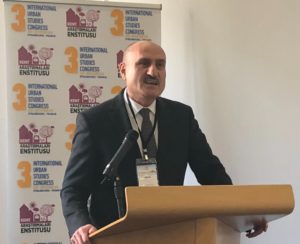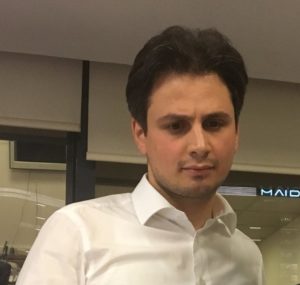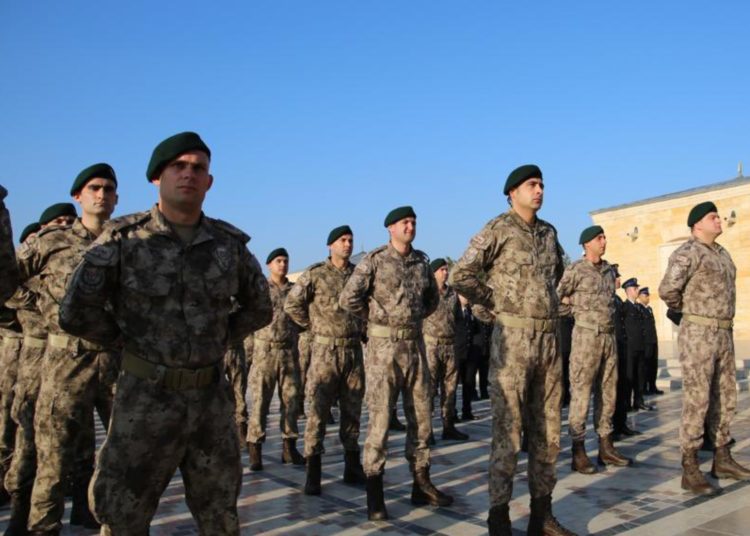Abdullah Bozkurt/Stockholm
The execution of a May 2022 agreement between Turkey and Palestine to train Palestinian law enforcement agencies in Turkey was entrusted to the hands of a police chief who was red flagged during a counterterrorism probe into the Islamic Revolutionary Guard Corps (IRGC) Quds Force network.
The agreement, signed in the form of a Memorandum of Understanding (MoU) on May 24, 2022 by the deputy interior ministers from both sides, paves the way for the training of Palestinian law enforcement officers in Turkey.
The main institution that will train the Palestinians is the Police Academy (Polis Akademisi in Turkish), part of the police department, the main law enforcement agency in Turkey with over 330,000 personnel.
The Gendarmerie and Coast Guard Academy (Jandarma ve Sahil Güvenlik Akademisi), a relatively new institution that was established in 2016, is also named as another government agency that will train candidates.
The MoU was submitted to parliament by Turkish President Recep Tayyip Erdoğan for ratification on November 9, 2022 and is expected to soon clear the committees and general assembly since Erdoğan’s Justice and Development Party (AKP) and his nationalist allies have a majority in the legislature.
2022 agreement between Turkey and Palestine to train Palestinian law enforcement in Turkey:
However, the ideology, mindset and worldview of those who administer law enforcement organizations in Turkey remain a cause for a concern for observers of Turkish politics. A massive purge, launched by Erdoğan after 2013 graft probes that incriminated him and his associates in an Iran sanctions busting scheme, took a toll on the police and gendarmerie.
The government summarily and arbitrarily dismissed 34,636 police officers including the most veteran chiefs from the force and replaced them with nationalists, neo-nationalists and Islamist who hold anti-Western and anti-Israel views. The senior leadership is staffed by people who despise the West and harbor anti-Semitic views.
One such figure is Yılmaz Çolak, the president of the Police Academy, which has been designated as an agency to train Palestinian law enforcement officers. Çolak’s links to Quds Force operatives in Turkey were exposed during a multi-year, confidential probe into the group, known by its Turkish name, Tevhid Selam.

The investigation launched in 2011 by Istanbul prosecutor Adem Özcan under case file No.2011/762 identified 232 Turkish and Iranian suspects after painstaking surveillance of operatives, wiretapping of their phones and internet communications and a review of shell companies that were used as covers to mask secret operations. The prosecutor’s probe lasted until 2014 before Erdoğan stepped in to kill the country’s most comprehensive counterespionage investigation.
The court-authorized wiretaps revealed that Çolak was facilitating the recruitment of candidates for the academy, which was sponsored by Quds Force suspects, and secured them positions at the academy.
Çolak’s connections to Quds Force cells were discovered when police, under orders from the investigating public prosecutor, tapped the phones of known Iranian asset Furkan Torlak (37), who was then working as an advisor to Numan Kurtulmus, deputy chairman of the AKP. Torlak had been groomed at an Iranian-run Shiite ḥawzah (seminary) in Syria from 1997, when he was 12, until he turned 21. Turkish police tracked all of Torlak’s visits to Syria, where he had spent his teenage and early adult years under the supervision of his handlers from the Quds Force.
A secret wiretap that reveals Çolak’s connections to known Iranian asset Furkan Torlak:
Thanks to Çolak, Torlak was brought to the police academy as a lecturer despite the fact that he had no credentials and his background check should have triggered alarm bells. Yet Çolak personally vouched for him in a letter of approval sent to the Prime Ministry Undersecretariat in 2013, and Torlak was assigned as a lecturer to teach Arabic at the Police Academy’s faculty of security studies (Güvenlik Bilimleri).
Using his position at the academy and personal ties to Çolak, Torlak brought more Quds Force operatives to the academy. For example, according to a wiretap dated September 1, 2013, Torlak told Çolak about a candidate named Ali Haydar Harmankaya and asked him to secure Harmankaya’s entry for intelligence studies at the academy.
Torlak is married to Sümeyye Nur Torlak, the daughter of Burhan Kavuncu, one of the leading figures in establishing the Iran-backed Hizbullah. Kavuncu helped Torlak land advisory positions within the government as well as in the ruling AKP. He currently works as an advisor to the culture and tourism minister. His connections to the Quds Force came to light one-and-a-half years after the probe was launched, prompting the prosecutor to secure a warrant to wiretap his phone and place him under surveillance.
Selman Yuyucu, a police chief who had worked the Quds Force investigation, testified at a hearing on May 31, 2018 at the Istanbul 14th High Criminal Court and revealed Furkan Torlak’s secret background:
The wiretaps show that Torlak obtained classified documents illegally through his wife Sümeyye, who was working for the Public Security Institution (Kamu Güvenliği Teşkilatı) at the time. In the wiretap his wife told him that if she sent the classified material through the mail, the government might be able to identify her as a leak. Instead she said she would bring hard copy home to avoid detection.
The investigation also revealed how Torlak hid his activities and education in Syria in the CVs he submitted to support his employment in government agencies at the recommendation of Sefer Turan, another suspect in the Quds Force probe. He did not want to raise red flags during background checks. Turan, currently serving as chief advisor to President Erdoğan on Turkey’s relations with Arab and Muslim states, especially in the Middle East and North Africa, had worked for the Iranian-financed radical publication Yeryüzü in the 1990s, promoting the Iranian mullah regime.

How the entire operation unmasked Torlak’s hidden background and his connections to Quds Force operatives was revealed during a hearing on May 31, 2018 at the Istanbul 14th High Criminal Court by Selman Yuyucu, a police chief who had worked the Quds Force investigation. Yuyucu also explained how the Quds Force concentrated its efforts on the Police Academy, a critical institution that helps develop the police force culture, identifies threats and risks and shapes government policies for approaching crime and terrorism.
With the MoU, Palestinian trainees will be subjected to this radically changed culture at the Police Academy, which is run by Quds Force operatives and their associates. The agreement, originally signed in Ramallah in May, is valid for one year with an automatic renewal unless either party decides to withdraw.












